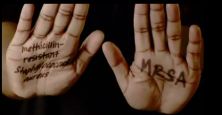 Health care-associated infections usually occur when germs are transferred by health-care providers’ hands touching the patient4 May 2013 – Every year, a global campaign, known as Hand Hygiene Day, takes place on 5 May 2013 to raise awareness of the importance of hand-hygiene as a key approach in preventing disease. The slogan of this year’s campaign is: “Save lives; clean your hands”.
Health care-associated infections usually occur when germs are transferred by health-care providers’ hands touching the patient4 May 2013 – Every year, a global campaign, known as Hand Hygiene Day, takes place on 5 May 2013 to raise awareness of the importance of hand-hygiene as a key approach in preventing disease. The slogan of this year’s campaign is: “Save lives; clean your hands”.
The campaign aims to reduce the spread of life-threatening infections through improving hand hygiene practices in health care settings. Hand hygiene is a simple, low-cost measure which is proven to be effective in preventing health care-associated infections, otherwise known as nosocomial infections.
These infections affect hundreds of millions of patients worldwide, in both developed and developing countries. They can lead to serious illness, prolonged hospital stays, long-term disabilities, added costs to patients and their families, additional financial burden on the health care system, and sometimes, tragic loss of life.
Celebrations for 5 May 2013 aim to be as inclusive as possible. The campaign calls for health care facilities to work with patients and their families, patients’ organizations and local communities to promote hand hygiene.
Patient voices can act as a powerful tool and their participation is needed to achieve improvements in health care by building and strengthening a strong patient safety climate.
Already more than a 1000 health care facilities in 22 countries of the Eastern Mediterranean Region have joined the global movement and expressed their commitment to improving hand hygiene by registering on the WHO web site Saves live : clean your hands.
Related links
Press release: WHO “Save lives: clean your hands”
Save lives: clean your hands web site








